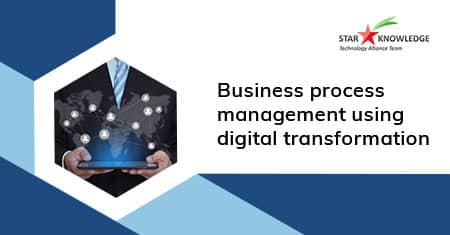
06 Oct Digital Process Automation with Business Digitization
06 OCT 2021

Possibilities of digital process automation are more in business digitalization; business automation may sound like a traditional process to all executives and managers hold on! Did traditional automation have a human exception? Probably not, business digitization brings technology into play and executes all your business processes automatically without human interventions.
Bringing technology into business is what digitization means, and it is more important to learn – what an effective digital transformation can do for your business? Because an effective digital solution pushes your organization towards future customer demands using the right technology. This article delves into the realm of digital process automation and its pivotal role in enabling business digitization.
Understanding Digital Process Automation
Digital process automation (DPA) refers to the use of digital technologies to automate and optimize business processes across various functions, such as finance, human resources, sales, customer service, and supply chain management. It involves the integration of artificial intelligence (AI), machine learning (ML), robotic process automation (RPA), and workflow automation to streamline workflows, increase productivity, and enhance decision-making.
Key Benefits of Digital Process Automation
Enhanced Efficiency
By automating repetitive and manual tasks, digital process automation enables employees to focus on more strategic and value-added activities. It reduces human error, accelerates process execution, and improves overall operational efficiency.
Improved Agility and Flexibility
DPA empowers organizations to quickly adapt to changing market dynamics and customer demands. Automated workflows can be easily modified, enabling businesses to respond swiftly to new opportunities or challenges without major disruptions.
Cost Savings
Automation significantly reduces operational costs associated with manual processes. By eliminating manual data entry, reducing paperwork, and minimizing errors, businesses can achieve substantial cost savings and reallocate resources to more critical areas.
Enhanced Customer Experience
DPA enables organizations to deliver superior customer experiences by automating customer interactions, reducing response times, and ensuring consistent service quality. It facilitates personalized interactions and faster query resolution, leading to increased customer satisfaction and loyalty.
Data-Driven Insights
Through DPA, businesses can capture, analyze, and utilize vast amounts of data generated by automated processes. This data can be leveraged to gain actionable insights, optimize operations, identify trends, and make informed strategic decisions.
Tasks automation
Social media postings, invoice processing, Sales CRM update, automated ticketing systems. Enhancing enterprise operations and reducing cost is what every business leader wants from any solution they adapt, Robotic Process Automation (RPA) is one such solution that CIOs are fond of now! RPA helps interpret tedious tasks, process transactions, automate responses, and establish communication between other digital systems.
- Walmart
- Deutsche bank
- AT&T
- Walgreens
- American Express
- Vanguard
When it is automating tedious tasks bot automation comes into the picture. Bots will help Automating repetitive tasks, data entry tasks, chats, etc, including automating a wide range of pre-defined operations. Integration bots and automation bots are the two types of bot services to help businesses automate either part of the process or complete.
Digital Process Automation and Business Digitization
Digital process automation plays a crucial role in the broader context of business digitization. It serves as a catalyst for digital transformation by enabling organizations to digitize and optimize their core business processes. Here’s how DPA contributes to business digitization:
Process Digitization: DPA enables the digital transformation of manual, paper-based processes into digital workflows. By digitizing and automating processes, organizations can eliminate inefficiencies, reduce reliance on physical documents, and achieve end-to-end process visibility.
Seamless Integration: DPA facilitates seamless integration between disparate systems and applications across the organization. It breaks down data silos, allowing for real-time data exchange, collaboration, and information sharing, leading to improved cross-functional efficiency.
Intelligent Automation: By incorporating AI and ML capabilities, DPA can automate complex decision-making processes. Intelligent automation systems can analyze data, learn from patterns, and make data-driven decisions, enhancing process efficiency and accuracy.
Scalability and Adaptability: DPA solutions provide scalability and adaptability to accommodate business growth and evolving needs. As organizations expand, they can easily scale up their automation initiatives, incorporating new processes and functionalities.
Compliance and Risk Management: DPA ensures adherence to regulatory requirements and enhances risk management capabilities. Automated workflows enable organizations to enforce compliance, maintain audit trails, and proactively address potential risks or non-compliance issues.
Read More: Business process automation and power automate – use cases
To implement automation effectively during your digital business transformation consider including the below tips in your strategy:
- Measure the impact: first and far most measure or predict the impact of RPA on your people and business. RPA will impact your employees’ work culture and business process by availing them to automate some part of their daily routine.
- Manage expectations: Yes, automation bots will replicate your tedious tasks while that is only to make your other employees spend their time in more quality of work.
- RPA governance: Unchecked actions or minor change negligence around the process will dramatically impact the performance of your business processes.
- Business goals: Ensure your business goals are unharmed during implementing RPA because the tools you choose, the process you automate, the tool stack you merge with, employee involvement, etc., cause business failures if unplanned.
Conclusion
In an era driven by digital innovation, businesses must embrace digital process automation as a strategic imperative to achieve business digitization. By harnessing the power of automation technologies, organizations can optimize operations, drive efficiency, and enhance customer experiences. Digital process automation serves as a catalyst, enabling businesses to transition from manual, paper-based processes to streamlined digital workflows, leading to increased agility, improved decision-making, and sustainable growth in the digital age.
Expectations on business automation are on the rise due to efficiencies achieved in digital business processes that increased digital transformation embracers around the world, looking to automate your business process? Contact us for business process automation solutions.
Our Related Posts
BPM in digital transformation
As we know business process management is not about managing a task or project, rather detailed attention towards process management…
Digital Adoption for Successful Digital Transformation
Enabling users’ ability to use digital touchpoints undisturbed is what digital adoption means, digital portals that assist users…
Digital Customer Experience
Digital Customer Experience (DCX) is a vital component for the businesses willing to transform their legacy business models to digitalization on the cloud..





Sorry, the comment form is closed at this time.